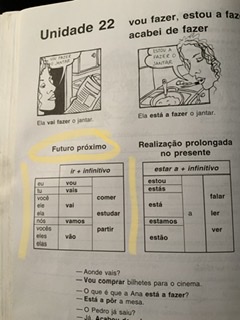What is the difference in meaning of these sentences? Qual é a diferença de significado dessas frases?
Hei de visitar a minha avó.
Eu visitarei a minha avó.
Eu vou visitar a minha avó.
This expresses a desire, maybe even a promise, but not necessarily with 100% certainty. It’s like saying “One day, I shall visit my grandma.”
These two are the exact same thing and they both sound more definitive than the other sentence with hei.
The only difference is that the former is the true future tense in Portuguese (the one you find in verb conjugation tables), while the latter is a simplified form of the future with the auxiliary verb ir. The former is formal and isn’t as commonly used as the construction with ir ![]()
Thank you for a very clarifying answer.
One thing I’ve noted is that the grammar books for us learners tends to cover the details of every freaking conjugation possible. When, in reality, a fairly small number of the conjugations are used in daily life.
So far, my observation is that Indicative, PPS, Imperfeito and Futuro Próximo are the biggies. Probably imperative, too.
@Joseph - any thoughts on where we learners can cut corners; or maybe better put, put our time to more useful pursuits?
Well, some corners are already cut at Practice Portuguese. We don’t really bother with the second-person plural vós, or with sophisticated verb tenses such as the Pretérito Mais-que-perfeito (= Past Perfect). The conditional tense is formed so consistently that it also doesn’t get the same level of attention as all the other ones. But beyond this, there’s only so much you can ignore or for only so long, because you’ll inevitably face it at some point. Our language really makes use of all its resources. So… I don’t know. Difficult question to answer!
The only other thought is, to concentrate on the 13 most commonly used verbs. This is the suggestion of my Português teacher
Hi @stephencanthony, thanks for this v interesting comment. That is good to know. One question - what is the ‘Futuro Próximo’ please? Not sure if I’ve seen that tense.
Acho que — and I do mean I think (and so could easily be wrong - I’m no grammar wiz - not by a long shot) - the immediate future. What’s going to happen very soon, what’s planned, etc. Contrasted with the idealized, hoped for future.
Also - I wrote my original note about 1 year ago - For all I know I may have been been reading some pre-Acordo-Orthographica and was basing my observation on that.
I will add that as I’ve continued my studies, I find that the Pretérito Mais-Que-Perfeito Composto do Indicativo (Ter(Imperfeito) + Past Participle) and Pretérito Perfeito Composto do Indicativo ( Ter(presente) + Past Participle) get used quite a bit - at least in my readings. And to be clear the readings are translations - not native portuguese writers; so it could be a function of the translator that is causing the use of these two conjugations.
There’s no tense or construction called “Futuro Próximo” in Portuguese, so actually, I don’t know what you meant at the time either, @stephencanthony, but that’s okay! 
Edit: Could it be the future with auxiliary verb ir + infinitive form, @stephencanthony? They do call it near future in French, for example.
Olá Joseph,
conheço também a designação em português “ Futuro próximo “, pelo menos seguinte da “Gramática ativa 1” da editora Lidel.

Ah, obrigado! Nunca vi o termo a ser usado em português.
Acho que essa edição é antes de Acordo Ortográfico… Às novas edições são em cores.
Então, não estou louco :=)